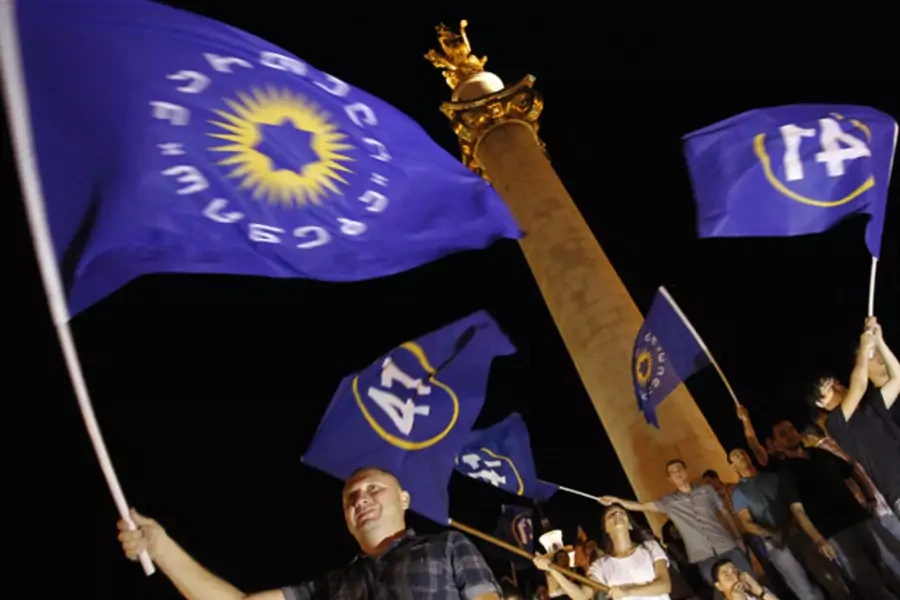Georgia’s Election Brings New Hope for Democracy

More on:
More than two decades after the collapse of the Soviet Union, the Republic of Georgia passed an important democratic milestone this week when the opposition party won the parliamentary elections and the incumbent president, Mikheil Saakashvili, conceded defeat. The door is now open for the first peaceful transition of power in modern Georgia’s history. The development is also a landmark for the Eurasian region of former Soviet Republics, where most elections have been rigged and often violent. I asked my colleague Anya Schmemann, who was in Georgia during the 2008 war with Russia, to put the news in historical and regional context. Here’s what she has to say:
Since the collapse of the Soviet Union twenty-one years ago, the fifteen former Soviet Republics have followed mostly bumpy paths toward and away from democracy.
On Monday, Georgians stunned the world when an opposition coalition led by eccentric billionaire Bidzina Ivanishvili won the parliamentary election there. President Mikheil Saakashvili conceded defeat on Tuesday, paving the way for Ivanishvili’s Georgian Dream bloc to form a new government.
When Ivanishvili becomes prime minister, as expected, it will be the first time in Georgia’s history that the government will have changed at the ballot box rather than through revolution.
To be sure, challenges remain. Saakashvili, who was swept to power in 2003’s Rose Revolution, will remain in power until presidential elections next year. Relations between the two men are frosty, to say the least. Due to recent reforms, the parliament and prime minister will acquire greater powers after the presidential election. But the six-party Georgian Dream coalition is fragile, its majority is thin, and its tycoon leader is a political novice.
The campaign was bitter. The opposition accused Saakashvili of monopolizing power, curtailing democracy and suppressing dissent. Indeed, Saakashvili used all the tools at his disposal, including state-run media, to secure a win, but his efforts to block his opponents ultimately failed.
For his part, Saakashvili, who waged a war with Russia in 2008 and has aggressively courted the West, warned that Ivanishvili, who made his fortune in Russia, would move Georgia away from the West and back into Moscow’s sphere of influence.
In remarks yesterday, Ivanishvili sought to calm those fears. “We’ll do our best to sort out relations with Russia,” he said, but, “our main aspiration is Europe and our security is NATO.” Nonetheless, some in the West fear that Russia will increase its sway in the region.
The United States, eager to see a peaceful transfer of power in Georgia, lauded the election as open and fair and praised Saakashvili for his gracious concession.
If Georgians succeed with a peaceful and orderly transition, it would be an important success story in a region riven by conflict and authoritarianism. In the Caucasus, Georgia’s neighbors Armenia and Azerbaijan are embroiled in their own frozen conflict and are ruled by hardline leaders (Ilham Aliev in Azerbaijan succeeded his father and Serge Sarkisian in Armenia has crushed his opposition).
In nearby Central Asia, the nations of Kazakhstan, Kyrgyzstan, Tajikistan, Turkmenistan, and Uzbekistan are among the most autocratic in the world. Kazakh leader Nursultan Nazarbayev and Uzbek leader Islam Karimov have both ruled since even before the Soviet collapse; Turkmen leader Gurbanguly Berdymukhamedov has continued his predecessor’s authoritarian ways; and Kyrgyzstan and Tajikistan have struggled to overcome poverty and conflict.
To the north of Georgia, Belarus, Moldova, and Ukraine have rolled back democracy; Ukrainian leader Viktor Yanukovych’s chief opponent is in prison; Alexandr Lukashenko of Belarus has routinely suppressed the opposition; and Moldovan politics have been unsettled, to say the least. Only the Baltic nations of Estonia, Latvia, and Lithuania have overcome the former Soviet curse and have successfully democratized as members of the EU and NATO.
Given Georgia’s fractious history, its contested election and transfer of power are remarkable and hopeful. Close Western scrutiny of the election surely mattered, and the United States and others will now need to help both sides navigate the transition to ensure its success.
More on:
 Online Store
Online Store